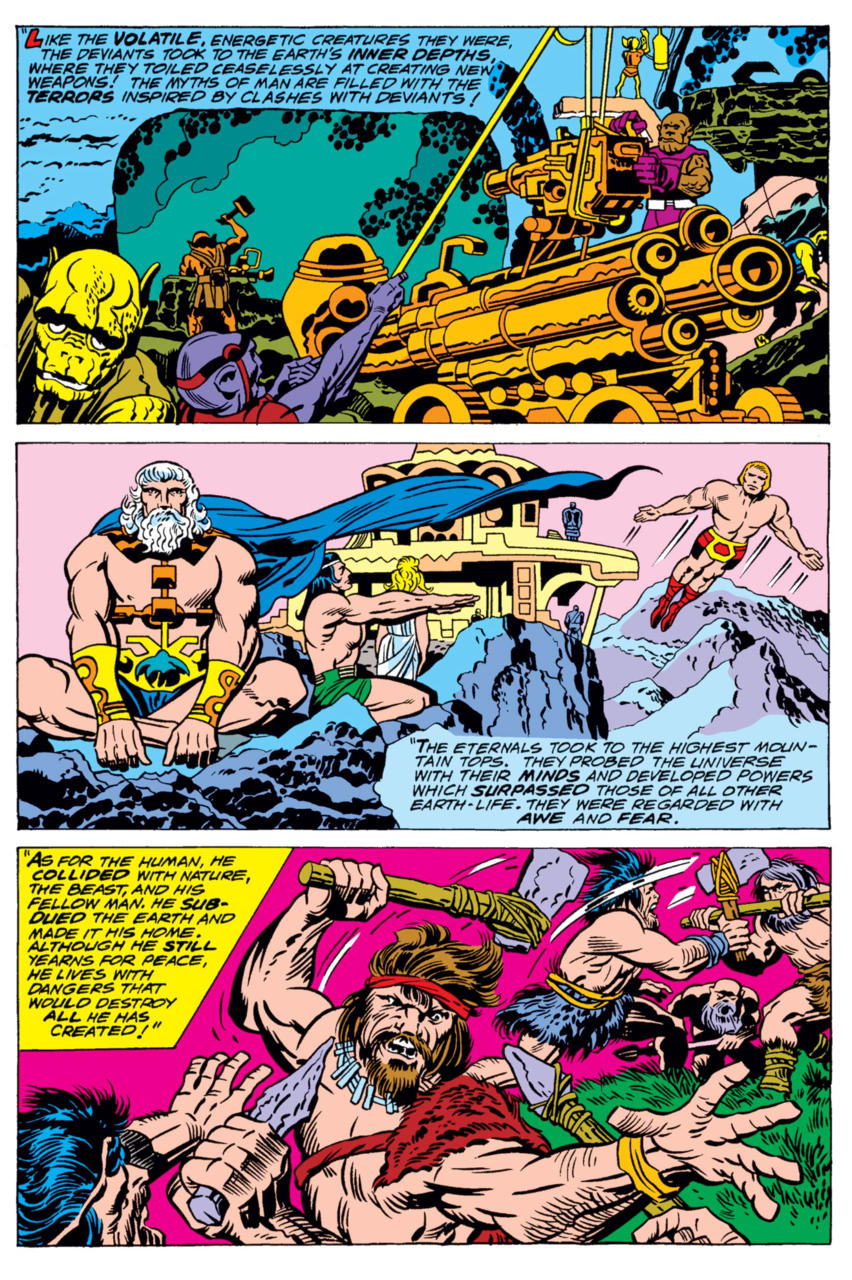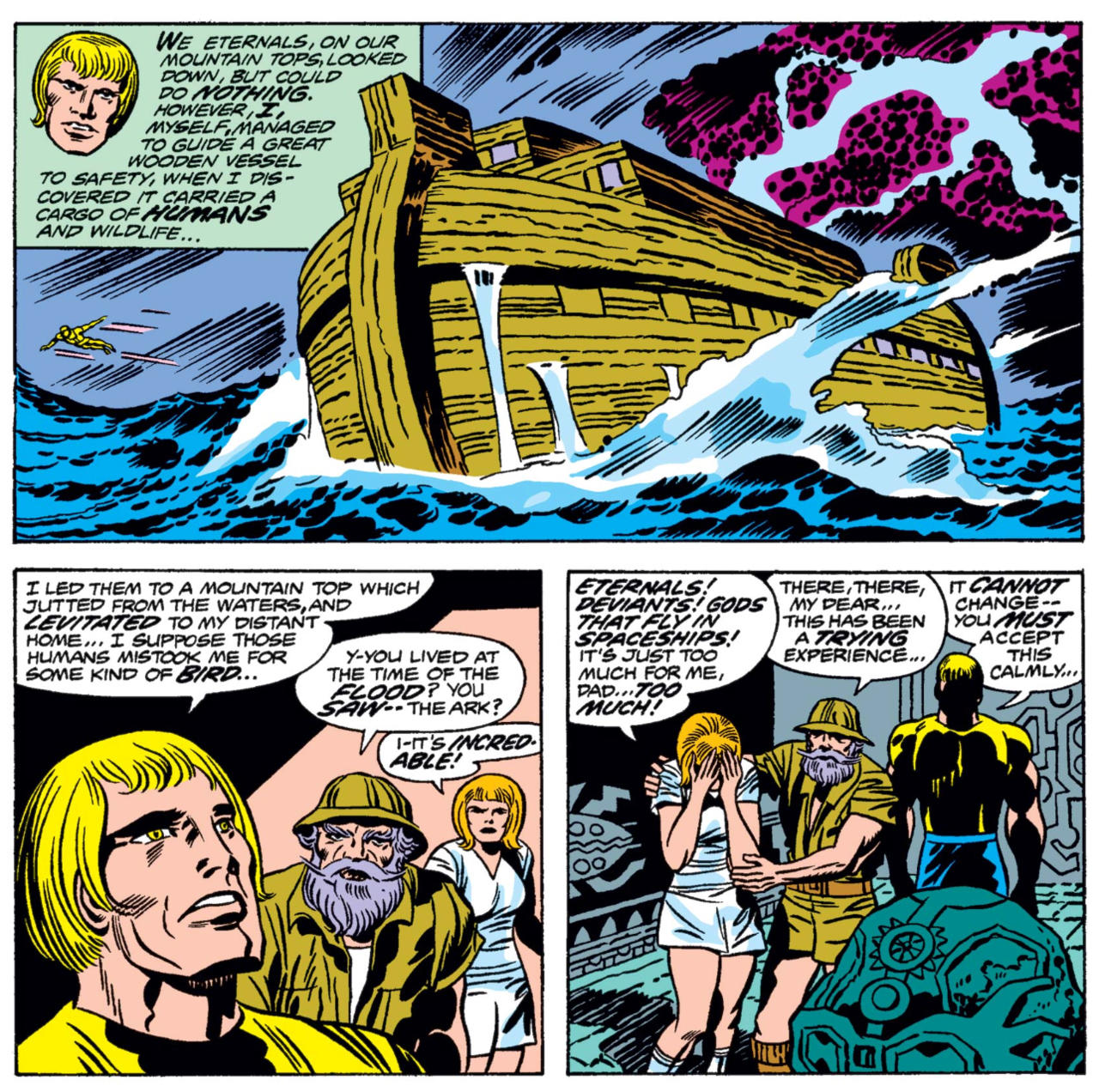The wait is finally over. Marvel Studio's massive Hall H panel at San Diego Comic-Con has revealed the cast and the line up of Phase 4's newest "team," the Eternals--and here's who they're working with.
- Angelina Jolie as Thena
- Richard Madden as Ikaris
- Ma Dong-Seok as Gilgamesh, the Forgotten One
- Salma Hayek as Ajak
- Kumail Nanjiani as Kingo
- Lia McHugh as Sprite
- Bryan Tyree Henry as Phastos
- Lauren Ridloff as Makkari
But major talent aside, the question still remains: Who--and, perhaps more importantly, what--are Marvel's Eternals? Where do they come from and how do they fit into the MCU's current landscape? Are they the next Avengers? The next Guardians of the Galaxy? The next Asgardians? Or are something else entirely? To get to the bottom of these questions, we need to take a look into some real-life superhero history.
The once and future King
It's impossible to disentangle the story of the Eternals from the legacy of one of comics biggest icons: Jack Kirby, the man responsible for co-creating the teams that established Marvel as we know it today like the Fantastic 4, X-Men, and Avengers. His name may not be as universally recognized as Stan Lee, but his fingerprints are all over the MCU and his ideas form the baseline DNA of our modern understanding of superheroes across the board. This is largely thanks to the fact that Kirby worked extensively on both Marvel and DC projects through most of what we know now as the Silver and Bronze ages--roughly between the early '60s to the late '70s.
Kirby's relationship with both Marvel and DC is a point of some historical contention, but the long and the short of it is that during his time at either company, he was largely given carte blanche to create the stories he wanted, which he would write, draw, and edit on his own. At DC, that manifested as the Fourth World saga, a new cosmic mythology that gave us characters like Mister Miracle, Darkseid, Steppenwolf (shout out to Justice League, I guess), and Big Barda. It was left unfinished after the books involved were canceled, though the characters and the stories were eventually picked up years later by other creative teams. The cancelation prompted Kirby to pack up and return to Marvel, where he did--well, essentially the same thing. The Eternals were Kirby's answer to the Fourth World for Marvel, and a chance to explore the same themes he began broaching over at DC in spite of his canceled books.
The themes themselves were pretty crazy. At this point in his career, Kirby was less interested in biff-bang-pow superheroics and more interested in things like high concept theology and how that would actually intersect with a world where superpowered gods walked the Earth. For the Fourth World, he took Judeo-Christian elements to make (and critique) a new, cosmic version of Heaven and Hell. For The Eternals, he went a bit more broad, cribbing from Greek, Roman, and Incan pantheons, as well as literary historical texts and epics--everything from The Odyssey to Shakespeare--to make a brand new creation myth for the Marvel Universe.
Okay, so what is the myth?
The Eternals story goes like this: The universe is populated with giant, timeless, immortal gods called Celestials who create experimental life on planets throughout the cosmos. Coincidentally, one of their experimental planets just happened to be Earth, about five million years pre-history, where they found the start of human life, conducted their experiments, and gave rise to three different "species" of humanity--humans, Eternals, and Deviants--all of which evolved over time as the Celestials observed from afar.

Humans were just regular humans, but Eternals and Deviants were special. Eternals were immortal, ageless and beautiful while Deviants were similarly timeless but monstrous and cruel. As the three species evolved together, the Eternals inadvertently became the foundation for many of humanity's myths--the gods of various pantheons, the main characters in fables, etc--while the Deviants were driven underground to effectively become the basis for human concepts like demons or Hell.
With the Eternal/Human/Deviant trinity, Kirby was able to recontextualize the whole of human history in the Marvel Universe--but the effects were extremely localized at first. It took years, but eventually, the new creation myth was retroactively applied to characters like Thanos (yeah, that Thanos) who was revealed to be a Deviant from his home planet of Titan, the result of another Celestial experiment.

The major conflict of Eternals-focused stories is usually two-fold. They are constantly at war with the Deviants who hate both the Eternals and all of humanity, but they also struggle against the Celestials who tend to believe their experiments have shelf lives. The Celestials visit their planets in "hosts" to instigate apocalyptic events (like the biblical 40-day and 40-night flood) to hit the hard reset button on all life--something that both the Eternals and the humans tend to take issue with.
Who are the Eternals?
Honestly, there are way, way too many Eternal and Deviant characters in the Marvel universe to keep track of, so for the sake of simplicity, we'll focus strictly on the ones we know about.
There's Ikaris, the de facto protagonist of Kirby's original series, and the father of Icarus, the guy with the wax wings from mythology. Ikaris is a friend of humanity and one of the major players in rallying his Eternal brothers and sisters to play a role in the world of superheroes.
Thena, an eternal who is "constantly mistaken" for the Greek goddess Athena, was the inspiration for the city of Athens. She had an affair with a Deviant leader named Kro which resulted in twin half-Deviant, half-Eternal children.
Ajak, who Hayak described in the panel as a sort of maternal figure, will be the leader of the group in the movie. Typically Ajak straddles the line between Greek and Aztec mythology.
Sprite, the "youngest" (though still totally immortal) is a trickster who is responsible for inspiring people like Shakespear to develope characters like Puck.
Makkari, a speedster, is the inspiration for the god Mercury. In this incarnation, Makkari will be the first deaf hero in the MCU.
Phastos, a super genius, and inspiration for the god Hephaestus. He typically carries a hammer with the ability to manipulate and influence machinery.
Kingo, a bit of an odd-man-out, is a swordsman Eternal who embraced human culture as a film star in Japan.
Gilgamesh, aka the Forgotten One, is one of the most physically powerful Eternals, who has existed throughout history as various folk heroes like Beowulf, Hercules, and Atlas.
Of course, there are dozens and dozens of other Eternals to mine from in the source material so it wouldn't be surprising for the MCU to spring some cameos into the mix--namely key characters like Zuras, who is typically one of the elder Eternals and leaders, or Sersi, a trickster Eternal, who features prominently as a love interest and otherwise chaotic force for the rest of the group.
What does this mean for the MCU?
The short answer is: it's almost impossible to tell. As it stands right now, outside from the existence of Thanos himself, we've only had one real allusion to the Eternals at all in the MCU--a throwaway line about Vormir (remember, the Soul Stone planet?) being the "center of Celestial space."
During the panel, the group was described as "a group of immortals who have been on earth for 35000 years, but we haven't met them before" by Marvel Studios boss Kevin Feige.
Introducing the Eternals into the MCU means a serious chance to start doing some real archaeology into the shared universe's history--way beyond what we've already done with movies like Captain America: The First Avenger and Captain Marvel--but with that opportunity comes some unique challenges. Because they're typically so tangential to the traditional superheroics, getting them to mesh in the established story will be tricky--even finding a place to back door them into the mix like Black Panther and Spider-Man via Civil War will be a careful balancing act.
However, risks aside, the Eternals mark a whole new universe of opportunity that could make the MCU seem even more expansive than it already is, and bringing the Celestial conflict into the spotlight is certainly one way to up the ante after Thanos.
The fact of the matter is, no matter what happens, the Eternals won't be a replacement Avengers, and they'll stand completely apart from other teams like the Guardians of the Galaxy or other mythologically inspired races like the Asgardians--which is a very cool prospect, but also an intimidating one. We'll just have to hold on and keep our ears to the ground for more Phase 4 news before we get too deep into the guessing game.
